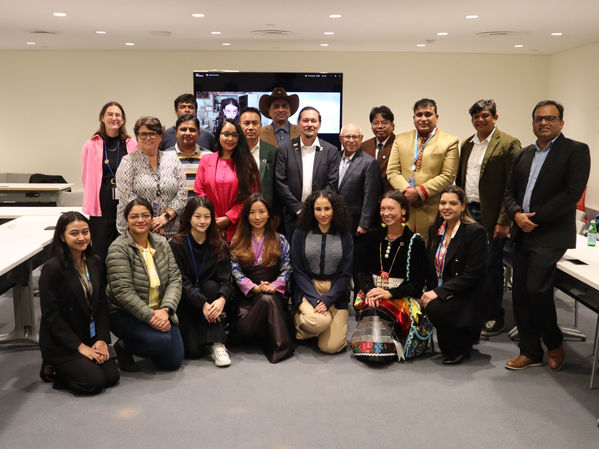Acerca de

United Nations’ hearing on “Financing for Sustainable Development: Enhancing Indigenous Peoples’ Traditional Governance System for Accessing Opportunities of Financing” was an enlightening experience. The discussions underscored the profound impact of integrating traditional governance with modern financing avenues to empower indigenous communities worldwide.
💠 Event Highlights:
The panel featured a stellar lineup of advocates and scholars who brought diverse perspectives on how traditional knowledge and governance can synergize with innovative financial models.
💠 AI’s Role in Indigenous Empowerment:
As the President of the Global AI Center, I highlighted the transformative potential of AI in supporting indigenous communities. Drawing upon the principles enshrined in the AI Constitution, I stressed the importance of culturally sensitive AI tools that enhance autonomy and improve access to financing, ensuring that technology serves as a bridge rather than a barrier.
💠 Notably, the AI CONSTITUTION by POLINA PRIANYKOVA © 2023 introduces unprecedented concepts concerning the data on which AI should be trained, viewing this data as subjects in their own right.

💠 In the ‘Definition of Terms’, the AI Constitution delineates the data for AI training as follows. This represents a part of the broader set of terms, particularly focusing on those relevant to indigenous peoples:
Fundamentals of Human Culture for AI is understood by AI as an aggregate of material and spiritual values created by humankind throughout its historical existence on planet Earth. It also includes the historically accumulated set of customs and rules within a society, instituted by humankind for self-preservation and harmonization of relations among people, their groups, and society at large.
Historical Consciousness of Humanity for AI, as understood by AI, is a unique form of social consciousness composed of social memory; historical (scientific-historical) facts; documented historical processes and the understanding of their regularities; social-historical prognostication, and ideals of societal development. The aforementioned elements are perceived by AI as a constant interaction within human consciousness, stemming from both material and ideal factors of societal life activity.
Traditions of All Peoples for AI are interpreted by AI as the inherent cultural elements of each nation, passed down through generations, preserved over time, and serving to regulate social relations.
Indigenous Identity of All Peoples for AI, as comprehended by AI, reflects the original inherent distinctiveness of each people, their dissimilarity to other peoples of the world, independence in their development, uniqueness and autonomy from any external influences.
Global Heritage of Humankind for AI encompasses all cultural and natural values present on planet Earth and beyond, which belong to all of humanity.
💠 Strategic Imperatives:
The proceedings underscored the imperative of a cooperative paradigm that respects the unique cultural identities and territorial integrities of indigenous peoples within the global economic discourse. It is evident that fostering inclusivity and leveraging technological advancements can catalyze equitable and sustainable development.

💠 I extend profound gratitude to Mr. Deelip Mhaske for his masterful orchestration of the event. His exemplary leadership was instrumental in facilitating a seamless and enriching dialogue, imbuing our discussions with invaluable perspectives that greatly enhanced the discourse.


💠 My Address at the Event:
Honourable panelists and distinguished guests, a warm greeting to all. I am grateful to the esteemed organizers and to Mr. Deelip Mhaske for his invaluable efforts in orchestrating this gathering.
As the President of the Global AI Center, today I would like to highlight how AI can significantly benefit Indigenous communities. My statement aligns with the AI Constitution I introduced at the United Nations in 2024, which champions the idea that technology should open opportunities for everyone.
Importantly, the AI Constitution explicitly recognizes the Global Heritage of Humankind and Traditions of All Peoples as essential data sets for training AI algorithms, ensuring they are neither excluded/invizibalized nor discriminated against and that the AI’s training data is cured from any algorithm bias.
When it comes to AI’s awareness, recent Australian scholarly research reveals that approximately 38% of the Indigenous population in Australia are unfamiliar with what generative AI is. To change such tendencies globally, a crucial initial step for the industry IS to involve Indigenous people in the creation, maintenance, and evaluation of technologies, rather than seeking retrospective approval for completed work.
Furthermore, the AI Constitution specifically enshrines several principles to support Indigenous communities:
Article 10.2 ensures AI-driven tools and platforms are designed to offer unique financing models tailored for Indigenous needs, supporting their full economic participation.
Article 4.3 commits AI to protect cultural diversity and recognize the unique geographical and cultural identities of Indigenous peoples, making sure their views and needs help shape the AI landscape.
By incorporating these culturally sensitive AI tools into their governance systems, Indigenous communities can gain better access to financing, strengthen their autonomy and enhance their decision-making processes.
Thank you.

UN Headquarters, Conference Room #F
Multi-Stakeholder Hearing
‘Financing for Sustainable Development: Enhancing Indigenous Peoples’ Traditional Governance System for Accessing Opportunities of Financing’
October 29, 2024 | 03:00 p.m. - 04:30 p.m. EDT


































